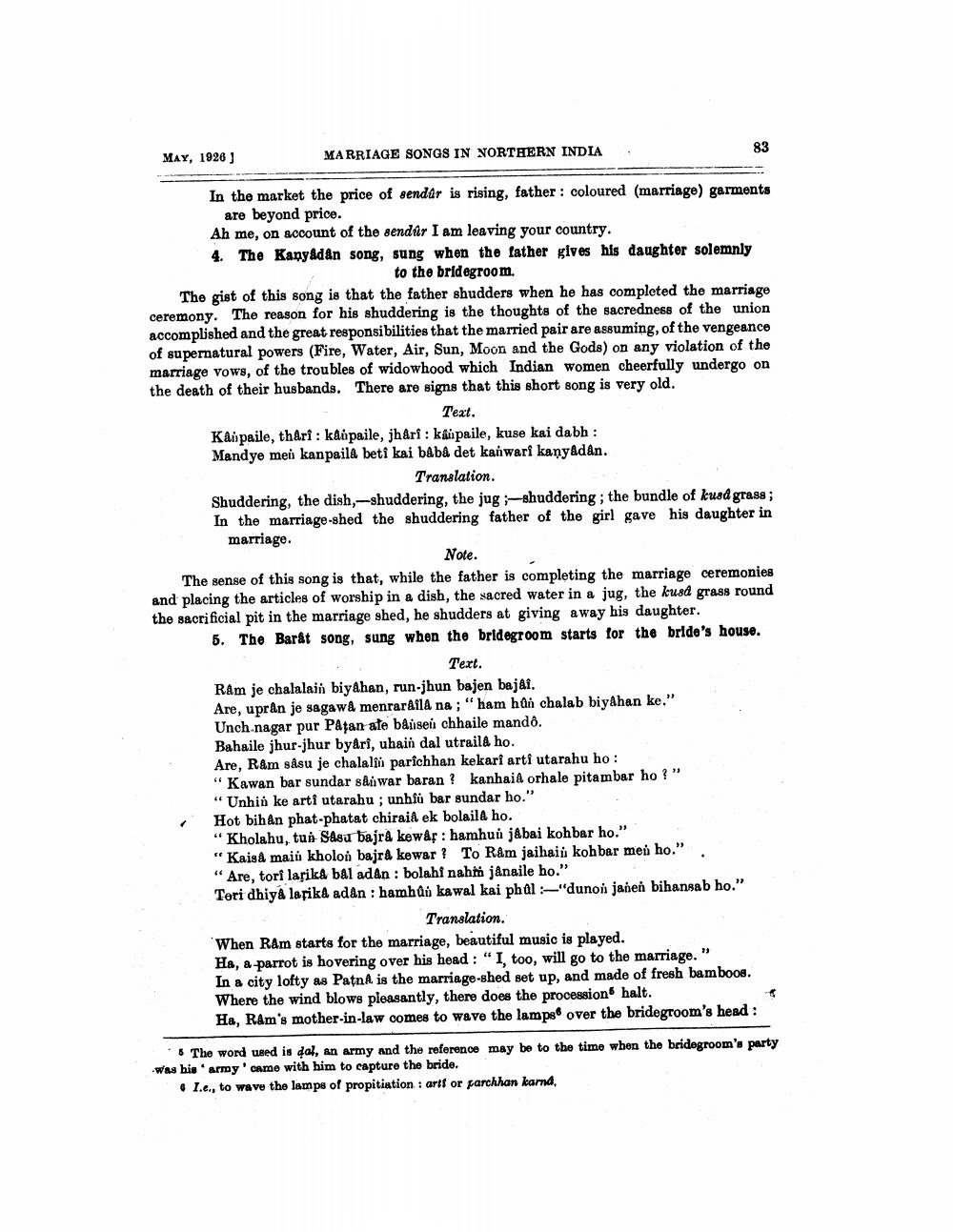________________
MAY, 1926]
MARRIAGE SONGS IN NORTHERN INDIA
In the market the price of sendûr is rising, father: coloured (marriage) garments are beyond price.
Ah me, on account of the sendûr I am leaving your country.
4. The Kanyâdân song, sung when the father gives his daughter solemnly to the bridegroom.
The gist of this song is that the father shudders when he has completed the marriage ceremony. The reason for his shuddering is the thoughts of the sacredness of the union accomplished and the great responsibilities that the married pair are assuming, of the vengeance of supernatural powers (Fire, Water, Air, Sun, Moon and the Gods) on any violation of the marriage vows, of the troubles of widowhood which Indian women cheerfully undergo on the death of their husbands. There are signs that this short song is very old.
Text.
Kaipaile, thârî: kaipaile, jhârî: kaipaile, kuse kai dabh : Mandye men kanpaila betî kai bâbâ det kanwarî kanyâdân.
83
Translation.
Shuddering, the dish,-shuddering, the jug;-shuddering; the bundle of kusd grass; In the marriage-shed the shuddering father of the girl gave his daughter in marriage.
Note.
The sense of this song is that, while the father is completing the marriage ceremonies and placing the articles of worship in a dish, the sacred water in a jug, the kusd grass round the sacrificial pit in the marriage shed, he shudders at giving away his daughter.
5. The Barât song, sung when the bridegroom starts for the bride's house.
Text.
Ram je chalalain biyahan, run-jhun bajen bajâî.
Are, upran je sagawa menrarâîlâ na; "ham hûn chalab biyahan ke."
Unch nagar pur Pâtan ate bâisen chhaile mando.
Bahaile jhur-jhur byârî, uhain dal utraila ho.
Are, Râm sâsu je chalalii parîchhan kekari arti utarahu ho: "Kawan bar sundar sânwar baran? kanhaiâ orhale pitambar ho? "Unhin ke arti utarahu; unhîù bar sundar ho."
Hot bihân phat-phatat chiraiâ ek bolaila ho.
Kholahu, tun Sasu bajra kewar: hamhui jabai kohbar ho." "Kaisa maiù kholon bajra kewar? To Râm jaihain kohbar meů ho." "Are, tori larika bal adân: bolahi nahm janaile ho."
Teri dhiya larika adân: hamhûn kawal kai phûl :-"dunon janen bihansab ho."
Translation.
When Ram starts for the marriage, beautiful music is played.
Ha, a parrot is hovering over his head: "I, too, will go to the marriage."
In a city lofty as Patna is the marriage-shed set up, and made of fresh bamboos. Where the wind blows pleasantly, there does the procession halt.
Ha, Ram's mother-in-law comes to wave the lamps over the bridegroom's head:
5 The word used is dal, an army and the reference may be to the time when the bridegroom's party was his army' came with him to capture the bride.
I.e., to wave the lamps of propitiation: artf or parchhan karna,




